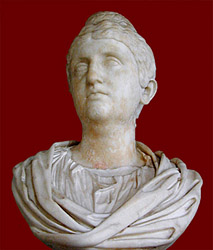| |
Dr. Ann R. Raia
Professor of Classics
Faculty Home page
Email:
araia@cnr.edu |
The College of New Rochelle
School of Arts
and Sciences
Department of Modern and Classical Languages |
Office: Castle 325
Phone: (914) 654-5398
Office Hours: Tu 9:30-12:30
and by appointment |
|
 |
CLS 495
ROMAN WOMEN:
PUELLA,
MATRONA, MERETRIX
Description: This course will focus on translation and
discussion of Latin texts which portray Roman women in marriage, the family,
and sexual relationships, and evidence male attitudes toward them, in a variety
of literary forms (comedy, satire, love poetry, epic, myth, letters, history,
inscriptions), from the 3rd Century BCE to the 3nd Century CE.
Spring 2007 Syllabus |
 |
Anticipated Learning Outcomes: at the conclusion of this
course, students will be able to demonstrate:
- Mastery of foundational Latin vocabulary, grammar, and syntax
- Ability to read, understand, and translate unadapted Latin passages
from a variety of authors and genres, with appropriate assistance
- Understanding of how Latin differs from the forms, grammar, and
syntax of English, leading to an increased understanding of how both languages
function
- Acquaintance with Roman daily life and culture during the Republic
and the Empire
- Awareness of social expectations of Roman women, the qualities
valued in them, and attitudes toward them at different class and economic
levels, in different genres, at different time periods.
- Facility in accessing and using on-line classical resources for
course reading and research.
Outcome Assessment: Students are required to--
- be present regularly for each weekly two-hour class meeting, with
additional meetings for tutoring or consultation where necessary (Outcomes 1-5)
- participate fully in class activities, such as discussion of issues
and reading, translating, and analysis of assigned and sight Latin passages
(all Outcomes)
- complete thoroughly and submit on time all assignments, including
daily translations, word searches, and on-line postings and discussions (all
Outcomes)
- submit in writing and make a presentation of two Semester Projects which will involve independent Latin
translation, research on Roman women in on-line and print resources, and
reflective writing. (Outcomes 1-3, 5, 6)
Materials of Instruction:
Print Course Texts:
S. Ciraolo, ed.
Cicero: Pro Caelio. Wauconda, Ill.: Bolchazy-Carducci, 1999
A. Raia, C. Luschnig, J. Sebesta, The Worlds of Roman
Women. Newburyport, MA.: Focus Publishing, 2005.
College-level Latin dictionary and grammar
On-Line Course Texts and Images:
Catullus, by
Allison Barker
Companion
to The Worlds of Roman Women:
Textmap, by A. Raia and Judith Sebesta
De Feminis Romanis, C.A.E. Luschnig, et
al. at Diotima
Feminae Romanae: The
Women of Ancient Rome, by Suzanne Cross
Forum
Romanum: database of authors
House of Paullus Aemilius Lepidus and
Cornelia
Intermediate Latin Readings, A. Raia,
et al.
Latin Library
Pliny, Letters: selected by
H. Walker
Perseus:
Latin and English
VRoma: Image
Archive
Women’s Life
in Greece and Rome by M. Lefkowitz and M. Fant, at Diotima
Supplementary Primary Source Readings: See
Companion Bibliography
Ancillary Materials:
See
Companion Resources
Commentaries, reading guides, articles
Angel, the
course management system for on-line syllabus, conferencing and communication,
document posting and reading, sharing resources.
Methods of Instruction: Class time will be used primarily for --
- reading Latin aloud, translation of prepared and sight passages,
analysis of language and content
- exchanging information about Roman women that emerges from essays,
texts and images -- their public and private functions, their celebrated
virtues and censured failings, male attitudes toward them and their stereotyped
roles.
- special sessions will be arranged for a guest lecture by
Dr. Barbara
McManus, Professor Emerita of Classics, a theater/museum fieldtrip, video
screenings of archaeological/artistic evidence on Roman women’s physical
lives, student project presentations.
Grading: Students will be graded on the quality of their
completion of the requirements listed above as follows:
60 % --attendance, participation in virtual and actual discussion,
prepared and sight translation, writing and reading assignments
15 % --Independent Project 1
25 % --Independent Project 2
Requirements and Policies: attendance is required, as is
appropriate class behavior; students are expected to meet deadlines: un-excused
late assignments will not be accepted; students who exceed the maximum number
of un-excused absences (1 in a 2-hour course) will find their grade negatively
affected in this category; make-ups will be arranged for students who have
medical or other serious excuses; students are expected to report an illness
through proper channels; those found cheating or plagiarizing will earn an F
for the course. At the beginning of the course, students with documented
special needs are expected to inform the instructor of accommodations or
services needed for successful academic participation.
Semester Projects:
1. Funerary Inscriptions:
Funerary inscriptions dating from a variety of time periods
provide an opportunity to “see” Roman women of all classes through
non-privileged writing and through sculptural and painted images. Due in
oral and written presentation on Tuesday, March 20.
2.
Latin Text Commentary: Your final project will make
a contribution to the available annotated Latin texts on women and will be your
summative independent learning experience. It will be edited by me and
published among the texts on
Companion to The Worlds of Roman Women, where you will be
credited as a contributor.
Select a complete
text or a portion of a text from the list provided; research the text in print
and electronic sources; develop a glossary and notes on grammar and content
appropriate for an intermediate-level Latin student; identify relevant images
for the text.
Once you have entered your
completed work as a document on
Angel we
will all read your text-commentary, translate it, and post our translations and
critique of your commentary.
The final projects completed by students in
the Fall 2002 Roman Women course are linked below (and on line at
De Feminis
Romanis); you may wish to consult them as models:
Kimberly Nickerson, Commentary to Pliny's EpistulaeVII.24
Jennifer Pinheiro,
Commentary to Cicero's
Pro CluentioV.12-VI.17
Cara West,
Commentary to Seneca's
De Consolatione ad Marciam 3.3-4.3 .
Schedule and Topical Outline: PUELLA, MATRONA, MERETRIX,
AMICA
The course topics derive from the theme of
the course: Roman Women. Selected texts, organized into four categories,
span the timeperiod from the 3rd Century BCE through the 2nd Century CE. The
readings illustrate both the positive and negative images of women within the
category; they evidence variations of the female role within the category; they
treat historical women, legendary women, and literary constructs. The texts are
almost solely narrated from the male perspective, a point of view that
secondary readings will help to challenge.
The
course begins with the least complicated female role of the course title,
puella, and proceeds to the most complex, amica; as a fictive
persona, it is not named in the course title. The course moves from reading
texts as evidence of real women’s lives to questioning the evidence by
examining stereotypes, counter-stereotypes, conflicting testimony,
socio-economic levels, gender bias and genre conventions.
The course meets weekly on Tuesdays from 2-4 p.m. in Chidwick 310.
Between meetings I would like us to be in contact by e-mail and/or during
office hours/by appointment. Assignments will be given in class and posted on
Angel after
each class meeting.
Tuesday, January 23:
Introduction to the course
content, pedagogy, syllabus, and the four units
Unit I: January 30-February 13: Readings about and discussion
of the Puella
Course Texts: A. Raia, C. Luschnig, J. Sebesta, The Worlds of
Roman Women, Companion to The Worlds of Roman Women
Additional Readings: Eve D'Ambra, Roman Women:
"Gender & Status"; A. Tanenbaum,
Women and
the Family; S. Dixon, "Roman Women: Following the Clues"; J. Hallett, “Women in
the Ancient Roman World” in B. Vivante, Women’s Roles in Ancient
Civilizations: A Reference Guide; J. Gardner, "Legendary Ladies" in
Roman Myths
Unit 2: February 20-April 3: Readings about and discussion of
the Matrona
Friday, February 23: Project 1 assignment due
Course Texts: Cicero, Pro Caelio, selections on Clodia, A.
Raia, C. Luschnig, J. Sebesta, The Worlds of Roman Women, Companion
to The Worlds of Roman Women
Additional Readings: Jane Gardner, Th. Wiedemann, eds., "The Laudatio
Turiae," in The Roman Household, pp. 48- 52; Suzanne Dixon, "The
allure of 'La Dolce Vita' in Ancient Rome," chapter 9, in Reading Roman
Women
Unit 3: April 10- 24: Readings about and discussion of the
Meretrix
Course Texts: A. Raia, C. Luschnig, J. Sebesta, The Worlds of
Roman Women, Companion to The Worlds of Roman Women
Additional Reading: A. Raia, Women's Roles in Plautine Comedy
Unit 4: May 1-8: Readings about and discussion of the
Amica
May 1: First Draft of Commentary Project due
Course
Texts: A. Raia, C. Luschnig, J. Sebesta, The Worlds of Roman Women,
Companion to The Worlds of Roman Women
Additional Reading: Giusto Traina, "Lycoris the Mime," in
Augusto Fraschetti, ed., Roman Women, tr. Linda Lappin.
May 15: Presentation and Submission of Final Draft of
Commentary Project

